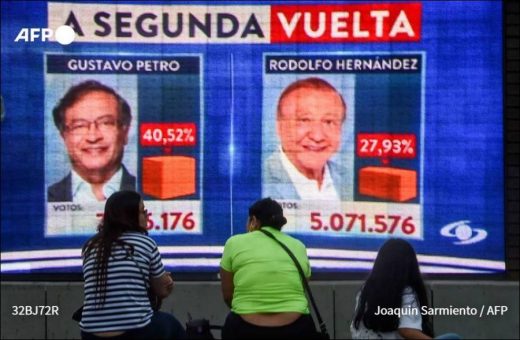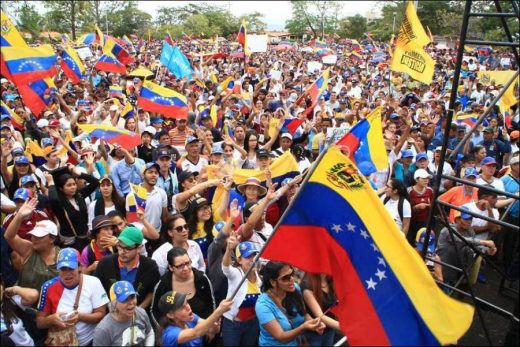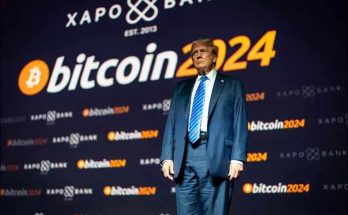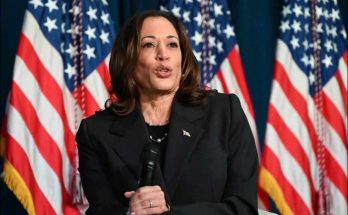The co-presidential candidate of the Broad Left alliance “Historical Pact”, former M19 guerrilla Gustavo Petro, won the first round of the presidential election. Petro hopes to become the country’s first left-wing president in two weeks.
Gustavo Petro was gleefully speaking at a campaign rally in Colombia before the first round of the presidential election last Sunday, while those in power were trembling with fear.
“Of course they are afraid,” ex-left guerrilla Petro, now embroiled in open political struggle, was telling thousands of his supporters in the capital, Bogota. “They are afraid because we will remove them from power.”
The Petro, which polls are leading by far, is battling with promises to bring big business-destroying changes to Colombia if elected. However, if neither candidate wins more than half of the votes as the polls predicted on Sunday, the two candidates with the most votes will run again on June 19th.
Competition extended to the second round
Other leading candidates include conservative Federico Gutiérrez, former mayor of Medellin, Rodolfo Hernández, a populist businessman and former mayor of the city of Bucaramanga, and Sergio Fajardo, a centrist former mayor of Medellin and former governor of Antioquia state.
Polls predict that in the second round, Petro will beat either Gutiérrez or Fajardo, who will face him. But while some polls went head-to-head with Hernández, who avoided discussing the Petro face-to-face and campaigning with videos on social media, the Petro has been on the rise again in recent polls, attracting many Colombians with the promise of ending corruption.
“I will go after all the thief politicians,” Hernández, 77, also said in an interview with Colombian television on Wednesday. “Not all are thieves, but almost all are thieves.”
However, it was Petro who made the headlines in a country that had never elected a left-wing president before, astonishing business leaders, military and conservative voters the most.
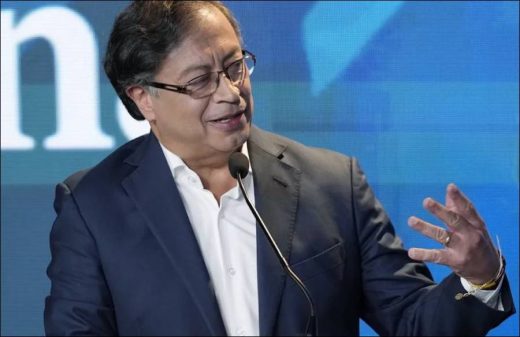
From rebel fighter to presidential candidate
Petro was once a member of the M-19 guerrilla group struggling to gain power in arms. Since 1990, when the rebels signed a peace treaty with the government, Petro has served as a congressman and mayor of Bogotá.
In his third run for the presidency, 62-year-old Petro hopes to join the ranks of the left-wing leaders who rule most of Latin America, after Mexico, Nicaragua, Venezuela, Bolivia, Peru, Chile, Honduras and Argentina.
Petro promised to raise taxes on the rich to fund anti-poverty programs. He says he wants to renegotiate international trade agreements, including with the United States, to protect Colombian industry and agriculture. To create a greener economy, it wants to gradually reduce oil production, the country’s largest export item, and replace it with tourism.
Employer threatening employees to vote for Petro
But all this could trigger capital flight, job closures and mass unemployment, according to many bosses who urged Colombians not to vote for Petro at the ballot box on Sunday.
“Colombia undoubtedly has problems. But that is no reason to jump into the abyss or risk radical change,” Miguel Cortés, one of Colombia’s most influential businessmen, said in a video message to voters.
Another employer, Sergio Araujo, recently announced on Twitter that whoever votes for Petro among his employees will be fired. In an interview with the news magazine Semana, Araujo described Petro as “the enemy of wealth who has been fighting free enterprise in Colombia for fifty years.”
Some middle-class Colombians are also concerned
Roxanne Restrepo, who works in banking and finance in Bogotá, is troubled by Petro’s plans to transfer from private pension funds to expand pension rights for poor Colombians.
“I was sending some of my savings overseas, now we are investigating if we can get Portuguese citizenship while we wait to see if we need to leave the country,” Restrepo says.
Petro also got into a fight with the Colombian military last month, alleging that some of the high-ranking officers were working in collaboration with drug dealers. This led to the Chief of Staff, General Eduardo Zapateiro, launching an angry tirade against Petro on Twitter. However, according to the Colombian constitution, the army was supposed to stay out of politics.
Former landlord Colonel John Marulanda, who fought against Petro during the guerrilla war and is now president of a national association of retired officers, openly said in an interview, “We don’t want a former guerrilla at the head of Colombia, we don’t want a retired guerrilla. And if he does, we oppose him.” said.
He can move the country away from the USA”
Marulanda and others also question Petro’s commitment to democracy. The first is because of Petro’s plans to forge closer ties with the authoritarian regime in neighboring Venezuela. This represents a significant shift for Colombia, which has long had close ties to the United States and always maintains a critical distance from the Caracas government.
Petro spoke of passing economic laws by decree if the umbrella alliance “Historical Covenant” failed to win a majority in Congress. Sergio Guzmán, director of the Colombian Risk Analysis consulting firm, comments that Petro’s decision is “not only proposing radical change in the economy right now, but pushing the nuclear button on what it could potentially do to democracy.”
Petro and the millions who support him want change
Petro says such criticisms are unfair and reminds that President Iván Duque, who was not allowed to run for the second time in a row, also enacted economic laws by decree during the pandemic.
Faced with accusations by opposition rival candidates that he was planning to seize private property if he won the presidency, Petro resorted to holding a notary public press conference and signing a document in which he pledged not to expropriate farms and businesses.
In an interview last month, Petro denied having a radical agenda. Petro says the United Nations has urged countries to steer clear of hydrocarbons, and that it’s common sense to raise taxes on the rich to help the poor after a pandemic that took Colombia’s poverty rate from 35.7% to 42.5% in 2020.
“These are normal things,” Petro said in a video conference speech. But in Colombia it is “seen as leftist and revolutionary stuff.”
Millions of desperate Colombians agree with Petro. Among them is the athletic trainer, 34-year-old Sara Gallego, who attended Petro’s closing campaign rally. After making a long list of the country’s woes, from unemployment to malnutrition, which he says were ignored by President Duque and previous governments, he says: “If the traditional ruling elites are wondering who is responsible for Petro’s popularity, they can’t blame anyone but themselves for it.”
Views: 922
